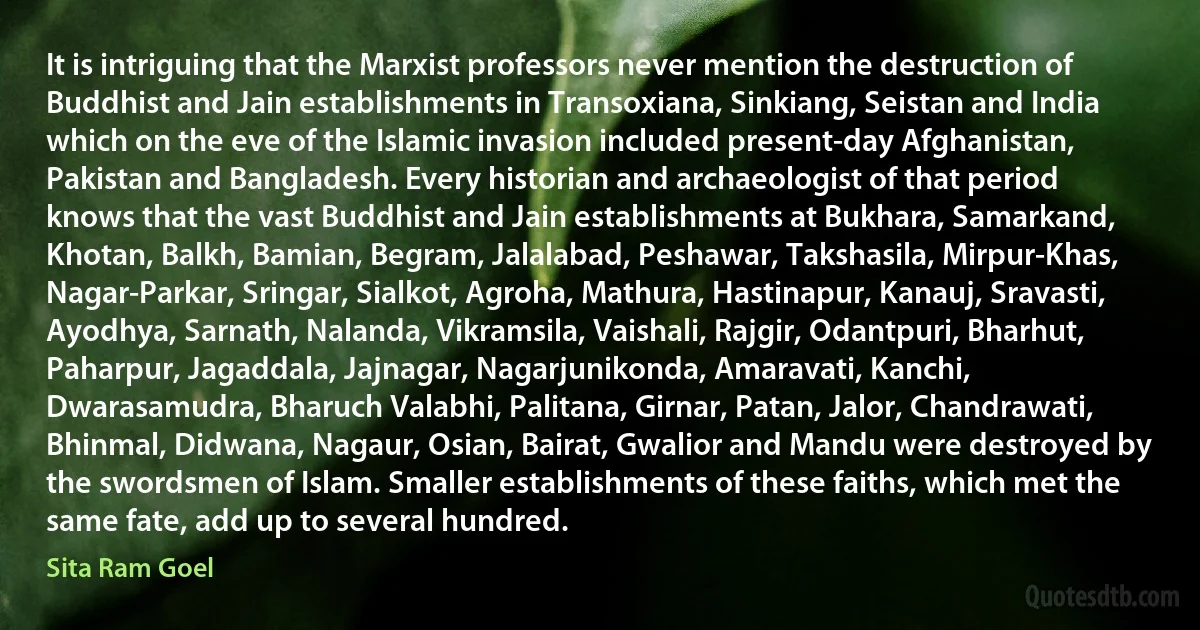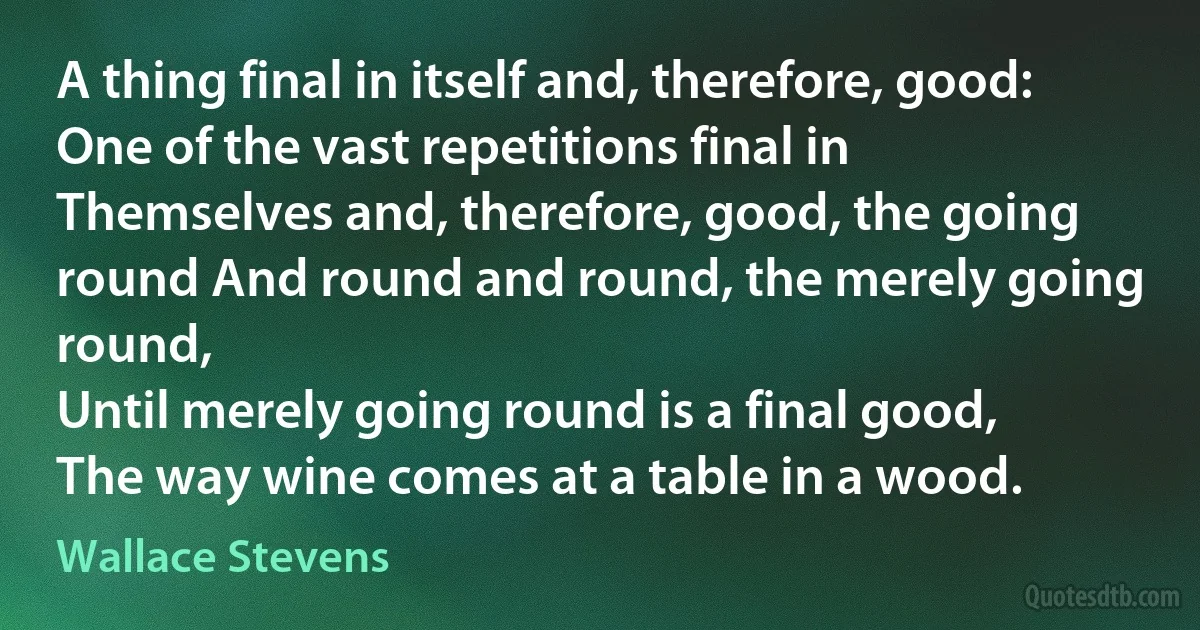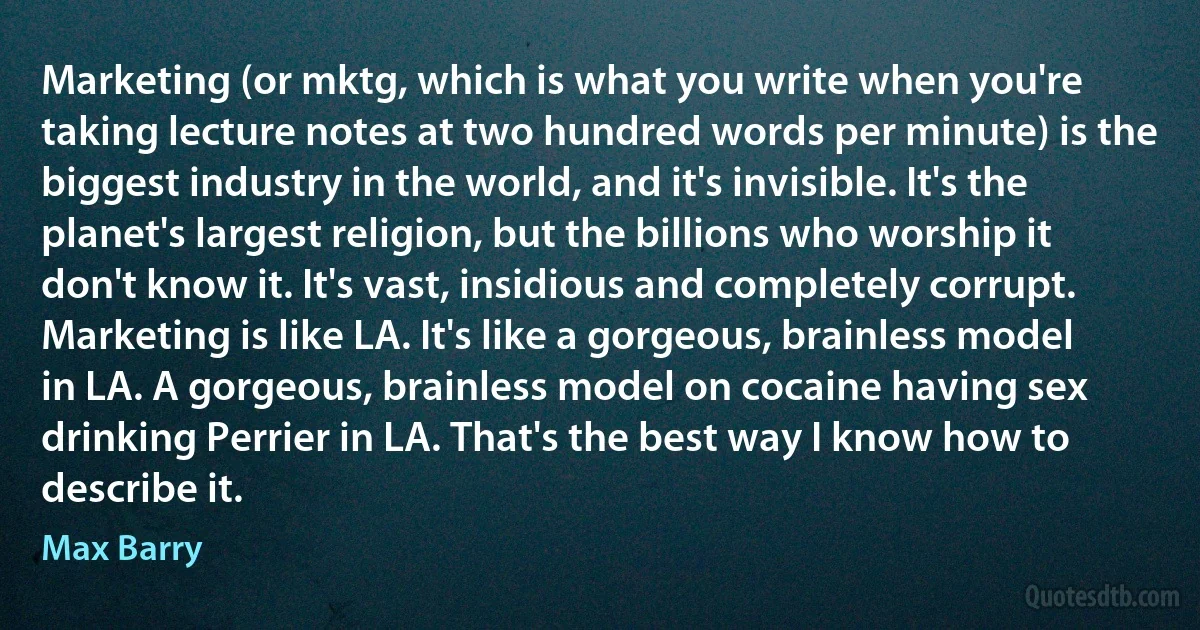Vast Quotes - page 54
Twenty years ago no one could have imagined the effects the Internet would have: entire relationships flourish, friendships prosper...there's a vast new intimacy and accidental poetry, not to mention the weirdest porn. The entire human experience seems to unveil itself like the surface of a new planet.

J. G. Ballard
All who have meant good work with their whole hearts, have done good work, although they may die before they have the time to sign it. Every heart that has beat strong and cheerfully has left a hopeful impulse behind it in the world, and bettered the tradition of mankind. And even if death catch people, like an open pitfall, and in mid-career, laying out vast projects, and planning monstrous foundations, flushed with hope, and their mouths full of boastful language, they should be at once tripped up and silenced: is there not something brave and spirited in such a termination? and does not life go down with a better grace, foaming in full body over a precipice, than miserably straggling to an end in sandy deltas?

Robert Louis Stevenson
An essential part of any successful action on the part of the United States is an understanding on the part of the people of America of the character of the problem and the remedies to be applied. Political passion and prejudice should have no part. With foresight, and a willingness on the part of our people to face up to the vast responsibility which history has clearly placed upon our country, the difficulties I have outlined can and will be overcome. ... to my mind, it is of vast importance that our people reach some general understanding of what the complications really are, rather than react from a passion or a prejudice or an emotion of the moment. As I said more formally a moment ago, we are remote from the scene of these troubles. It is virtually impossible at this distance merely by reading, or listening, or even seeing photographs or motion pictures, to grasp at all the real significance of the situation. And yet the whole world of the future hangs on a proper judgment.

George C. Marshall
Instead of spending our money on preparedness to fight, we should pour out billions in a common effort to solve common problems around the earth... on the scale of present preparations for total war. ...This vast sum should be spent on food, clothing, shelter, medicine, seed, fertilizer, livestock, machinery, tools and other requirements of efficient production and distribution. ...Instead of spending billions on preparedness to wage war with pestilence, vast sums should be spent on health measures and the eradication of plague from the face of the earth.

Kirby Page
In Indian Philosophy he not only laid a stone foundation surely and truly but also built an edifice that shall outlast any philosophic storm. It was not so much a history as an exposition, and the exposition was vivid, vital and gripping. It was full of feeling. It made an epoch by itself. It was the two volumes of Indian Philosophy in the "Library of Philosophy" that showed that there was hardly any height of spiritual insight or rational philosophy attained in the world that has not its parallel in the vast stretch he dealt with that lies between the early sages and the modern Naiyaikas [leaders].

Sarvepalli Radhakrishnan
Although the term Pueblo in Spanish literally means the people, and their towns, it is here specifically applied to the Christianized Indians (as well as their villages)- to those aborigines whom the Spaniards not only subjected to their laws, but to an acknowledgment of the Romish faith, and upon whom they forced baptism and the cross in exchange for the vast possessions of which they robbed them. All that was left them was, to each Pueblo a league or two of land situated around their villages, the conquerors reserving to themselves at least ninety-nine hundredths of the whole domain as a requital for their generosity.

Josiah Gregg
The rich in all societies may be thrown into two classes. The first is of those who are powerful as well as rich, and conduct the operations of the vast political machine. The other is of those who employ their riches wholly in the acquisition of pleasure. As to the first sort, their continual care and anxiety, their toilsome days and sleepless nights, are next to proverbial. These circumstances are sufficient almost to level their condition to that of the unhappy majority; but there are other circumstances which place them in a far lower condition. Not only their understandings labour continually, which is the severest labour, but their hearts are torn by the worst, most troublesome, and insatiable of all passions, by avarice, by ambition, by fear and jealousy. No part of the mind has rest. Power gradually extirpates from the mind every humane and gentle virtue. Pity, benevolence, friendship, are things almost unknown in high stations.

Edmund Burke
Where storm-born shadows hide and hunt
I knew thee, in thy glorious youth,
And loved thy vast face, white as truth;
I stood where thunderbolts were wont
To smite thy Titan-fashioned front,
And heard dark mountains rock and roll;
I saw the lightning's gleaming rod
Reach forth and write on heaven's scroll
The awful autograph of God!

Joaquin Miller
What it is, only God knows. In terms of matter I suppose the thing Ammi described would be called a gas, but this gas obeyed the laws that are not of our cosmos. This was no fruit of such worlds and suns as shine on the telescopes and photographic plates of our observatories. This was no breath from the skies whose motions and dimensions our astronomers measure or deem too vast to measure. It was just a colour out of space - a frightful messenger from unformed realms of infinity beyond all Nature as we know it; from realms whose mere existence stuns the brain and numbs us with the black extra-cosmic gulfs it throws open before our frenzied eyes.

H. P. Lovecraft
After the March to Finchley, the next print I engraved, was the Roast Reef of old England; which took its rise from a visit I paid to France the preceding year. The first time an Englishman goes from Dover to Calais, he must be struck with the different face of things at so little a distance. A farcical pomp of war, pompous parade of religion, and much bustle with very little business. To sum up all, poverty, slavery, and innate insolence, covered with an affectation of politeness, give you even here a true picture of the manners of the whole nation... By the fat friar, who stops the lean cook that is sinking under the weight of a vast sirloin of beef, and two of the military bearing off a great kettle of soup maigre, I meant to display to my own countrymen the striking difference between the food, priests, soldiers, &c. of two nations so contiguous, that in a clear day one coast may be seen from the other.

William Hogarth
It is in this context that in 1940, Savarkar launched his slogan: "Hinduize all politics, militarize Hindudom.” This slogan is nowadays often quoted out of context to impute to Savarkar a fascist-like fascination with "war for war's sake”. But it meant nothing of the kind. He wanted Hindus to get military experience for a specific purpose, viz. that after the war, England would find a vast number of combat-ready Indian troops before her...

Koenraad Elst
First, we must be very clear that you and the speaker are treating life not as a problem but as a tremendous movement. If your brain is trained to solve problems, then you will treat this movement as a problem to be solved. Is it possible to look at life with all its questions, with all its issues, which is tremendously complex, to look at it not as a problem, but to observe it clearly, without bias, without coming to some conclusion which will then dictate your observation? You have to observe this vast movement of life, not only your own particular life, but the life of all humanity, the life of the earth, the life of the trees, the life of the whole world - look at it, observe it, move with it, but if you treat it as a problem, then you will create more problems.

Jiddu Krishnamurti
[African Rift Valley soda lakes]. Steaming-hot water comes from volcanic springs and is so loaded with soda that around the margins of the lake it solidifies into white curds. Yet flamingos come here in thousands. [...] The fact that so few creatures can tolerate these conditions means that any animal that can, has the place to itself and so can proliferate in vast numbers.

David Attenborough
In the vast all of the Universe, must there be this unique anomaly - a consciousness that knows itself, loves itself and feels itself, joined to an organism which can only live within such and such degrees of heat, a merely transitory phenomenon? No, it is not mere curiosity that inspires the wish to know whether or not the stars are inhabited by living organisms, by consciousness akin to our own, and a profound longing enters into that dream that our souls shall pass from star to star through the vast spaces of the heavens, in an infinite series of transmigrations. The feeling of the divine makes us wish and believe that everything is animated, that consciousness, in a greater or less degree, extends through everything. We wish not only to save ourselves, but to save the world from nothingness. And therefore God. Such is his finality as we feel it.

Miguel de Unamuno
The Ageless Wisdom teaching was first made available to the general public around 1875 by Helena Petrovna Blavatsky in her seminal works: The Secret Doctrine and Isis Unveiled. Blavatsky established the Theosophical Society to introduce this `new' perspective on history and human evolution. The intermediate phase of the teaching was revealed by Alice A. Bailey who, from 1919 to 1949, collaborated with a Master of Wisdom known as `the Tibetan'. Through a process of telepathic overshadowing, the Master Djwhal Khul communicated a vast body of information about the world and its future.

Helena Petrovna Blavatsky
I will venture to say, that if all the other crimes which the human race has committed, from the creation down to the present day, were added together in one vast aggregate, they would scarcely equal, I am sure they could not exceed, the amount of guilt which has been incurred by mankind, in connexion with this diabolical Slave Trade. And is it not, then, the duty of every government, and of every nation on whom Providence has bestowed the means of putting an end to this crime, to employ those means to the greatest possible extent? And if there is any government and any nation upon whom that duty is more especially incumbent, is not that government the government of England, and are we not that nation? Political influence and naval power are the two great instruments by which the Slave Trade may be abolished; our political influence, if properly exerted, is great, our naval power is pre-eminent.

Henry Temple, 3rd Viscount Palmerston
Does life in some way make use of the potentiality for vast quantum superpositions, as would be required for serious quantum computation? How important are the quantum aspects of DNA molecules? Are cellular microtubules performing some essential quantum roles? Are the subtleties of quantum field theory important to biology? Shall we gain needed insights from the study of quantum toy models? Do we really need to move forward to radical new theories of physical reality, as I myself believe, before the more subtle issues of biology - most importantly conscious mentality - can be understood in physical terms? How relevant, indeed, is our present lack of understanding of physics at the quantum/classical boundary? Or is consciousness really "no big deal,” as has sometimes been expressed?
It would be too optimistic to expect to find definitive answers to all these questions, at our present state of knowledge, but there is much scope for healthy debate...

Roger Penrose
What we need in literature today are vast philosophic horizons - horizons seen from mastheads, from airplanes; we need the most ultimate, the most fearsome, the most fearless "Why?" and "What next?"
This is what children ask. But then children are the boldest philosophers. They enter life naked, not covered by the smallest fig leaf of dogma, absolutes, creeds. This is why every question they ask is so absurdly naive and so frighteningly complex. The new men entering life today are as naked and fearless as children; and they, too, like children, like Schopenhauer, Dostoevsky, Nietzsche, ask "Why?" and "What next?" Philosophers of genius, children, and the people are equally wise - because they ask equally foolish questions. Foolish to a civilized man who has a well-furnished European apartment with an excellent toilet and a well-furnished dogma.

Yevgeny Zamyatin



